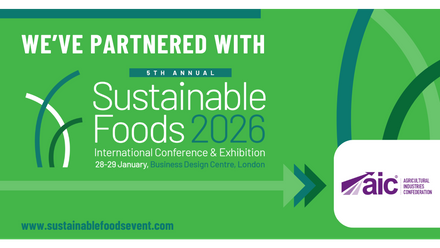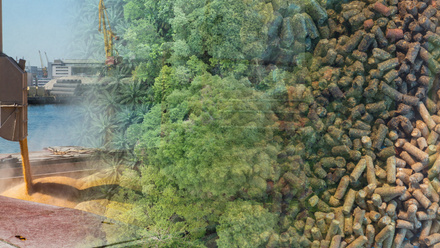Former food products shown to lower carbon footprint of animal feed
The UK Former Foodstuff Processors Association (UKFFPA) and the Agricultural Industries Confederation (AIC) has for the first time released verified carbon footprint scores for former food products (foodstuff) used in animal feed.
“The data on the environmental impact of former food products, which has been verified by the Global Feed LCA Institute, is extremely encouraging,” says John Knight, Technical and Compliance Director of SUGARICH, and chair of the UKFFPA.
“The results show that the use of these former food products can provide feed compounders with opportunities to reduce the environmental impacts of their feeds which, in turn, will help farmers reduce the environmental impacts of their livestock enterprises.
“UKFFPA members handle and process more than 650,000 tonnes of former foodstuffs per year. Keeping these highly nutritious products in the circular economy is a key element in helping to reduce food waste, and an important step in creating a more sustainable future.” explains Mr Knight.
Over the past year UKFFPA and its Dutch counterpart, VIDO, submitted data to Blonk consultants in the Netherlands to compile a carbon footprint score for each of the four products handled across both associations.
The four product types tested and their results, expressed in CO₂ equivalent units per Kg product1 are as follows:
|
Product Type |
Kg CO₂ eq/Kg product |
|
Dried single ingredient former foodstuff |
0.16 |
|
Fresh single ingredient former foodstuff greater than 50% DM |
0.027 |
|
Fresh single ingredient former foodstuff less than 50% DM (liquid) |
0.005 |
|
A blend of fresh former foodstuff ingredients with carriers |
0.22 |
David Moss, Technical Manager at AIC Services and UKFFPA Secretariat, says that having the data for the former foodstuffs sector on the GLFI database will be enormously important in enabling both feed compounders and livestock farmers to calculate the environmental impacts of their feeds.
“This data project contributes towards the circular economy targets set out in the AIC’s Roadmap for a Sustainable Food Chain. The target was to secure a further 10% increase in resource recovery volumes by 2030 – something which UKFFPA members are confident they can achieve,” Mr Moss concludes.
ENDS
About AIC
AIC is the UK trade association representing the agricultural supply chain sectors of Arable Marketing, Crop Protection and Agronomy, Feed, Fertiliser and Seeds, since its inception in 2003. In all, AIC represents members responsible for some £9 billion of farm trade. A significant part of its work is political lobbying and influencing as well as supporting members with technical information.
AIC Services, which is the professional services arm of AIC manages a range of services, including Assurance Schemes recognised by UK government as essential tools to underpin feed & food safety alongside fertiliser security. Currently these include:
|
TASCC |
Trade Assurance Scheme for Combinable Crops |
|
FEMAS |
Feed Materials Assurance Scheme |
|
UFAS |
Universal Feed Assurance Scheme |
|
ESTA |
European Seed Treatment Assurance |
|
FIAS |
Fertiliser Industry Assurance Scheme |
|
FAR |
Feed Adviser Register |
|
RED |
Renewable Energy Directive |
|
FAA |
Forage Assurance Scheme |
|
APOCS |
AIC Services Palm Oil Credit Scheme |
Press Contact
Rebecca Dawson
Account Director (maternity cover)
Mobile +44 (0)7711 915927
[email protected]




